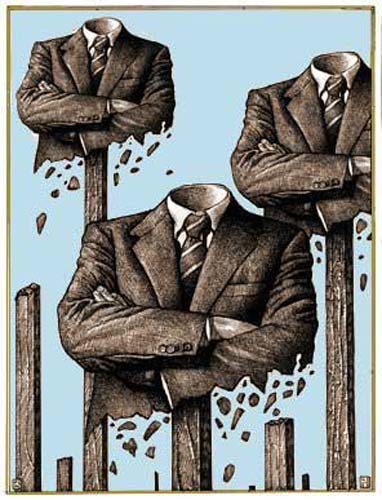 >
>
The death of Julian Bond, a leading 1960s civil rights leader who became chairman of the National Association for the Advancement of Colored People, raises a deep question about contemporary U.S. politics: Where are today's young Julian Bonds? Why isn't there a clear and identifiable national black leadership for the under-50 generation?
The answer isn't that the civil rights challenge is over. As the deaths in Ferguson, Mo., and Staten Island and beyond show, race remains a crucial area of injustice in the U.S. And as the Black Lives Matter protests demonstrate, people, black and white, can be motivated to participate in a social movement seeking to remedy that injustice.
What's striking about this new movement is how leaderless it seems. If you aren't convinced it is, close your eyes and try to name a single nationally known leader — not a celebrity or public intellectual, but an actual leader of people. What's the reason for an absence of leaders, good bad or indifferent, devoted to racial equality? And what does the answer tell us about the future of race equality in America?
There are, I think, two main explanations for the headless character of the new civil rights movement — and both are telling for the movement's trajectory. The first lies in the contemporary, social-media driven nature of civil rights today. The second is Barack Obama.
Start with the answer born of social technology. As events from Cairo's Tahrir Square to Occupy have shown, it's no longer necessary for protest movements to be led by charismatic, central figures. Once, such leaders helped frustrated and dispossessed people overcome what economists call the transaction costs of getting organized. Then, a moving speech or a name or a heroic story might motivate people to coordinated action.
Today, social media means coordination can take place in a decentralized way. Grievances, once shared, can be understood as universal. They alone are enough to bring people into the streets. And those gatherings can move political discourse.
Today's new civil rights movement is the product of people with access to social media and a mindset similar to other movements that spread over the same media. It isn't an accident that many recent protests arose from videos that went viral, many shot on cell phones. The vector of the outrage helped specify the direction of the movement.
But here's the problematic payoff: So far, social media-inspired movements haven't managed to create institutional change. Hosni Mubarak fell — but only because the Egyptian army willed it. Occupy brought fame to Sen. Elizabeth Warren and economist Thomas Piketty — but it hasn't yet got results for the 99 percent.
The difficulty with diffuse movements is that they are good at protest but bad at coordinated policy pressure, which takes an old-fashioned political party or movement. And leaders, for better or worse, are part of the political process. They drive change, and speak out over time when it's too slow in coming, as Julian Bond did.
The need for leadership brings us to the other reason why there's no obvious heir to Bond and his generation: Barack Obama has drained the energy out of African-American leadership.
To be sure, Obama isn't at fault, or not exactly. The historical process of electing a black president was always going to mean white Americans anointing the candidate (and the elected official) as the spokesman for black America — and at the same time imposing on him the obligation to speak for all Americans of all races.
It helped of course that Obama was racially complex. As son of a white mother and an African father, he was black, he was (part) white, and he was African and American without exactly being African-American, except by choice and marriage.
In any case, Obama's election meant that no other young black person could become the definitive spokesperson for African-Americans — because he or she would never match Obama's fame or success or influence. His election meant the passing of the generation of Jesse Jackson. The somewhat younger Al Sharpton became a shadow of his former self — a low-carb CNN commentator, Sharpton-lite.
As if on cue, Jesse Jackson Jr. imploded and disappeared. Cory Booker has always seemed genuinely to want to represent people of all races and backgrounds (disclosure: we were students together and I consider him a friend). Like Obama, he's a leader of Americans who happens to be black and cares about black people a lot, not a black leader per se.
Of course, in some ways it's a great thing for black Americans that no one leader needs to speak for the whole community. Yet it's worth realizing that, after he leaves office, Obama isn't going to become a race-leader either. He'll want to preserve his unique status, and speak on black issues occasionally when it seems necessary. But his presidential legacy, and probably his disposition, will require him to remain an American leader, looking at the interests of all. He isn't just the first black president. He'll be the first black former president, too — and for the rest of his life.
The consequence is that Obama may well keep on sucking the oxygen out of the system of black leadership for years to come — not by design, but by circumstance. Both black and white America will look to him for leadership on race before they look to anyone else. Which means anyone else will be a distant second-best.
Noah FeldmanBloomberg News
(TNS)
Comment by clicking here.
Noah Feldman, a Bloomberg View columnist, is a professor of constitutional and international law at Harvard University and the author of six books, most recently "Cool War: The Future of Global Competition."
Previously:
• 07/03/15: Supreme Court reaches the end of a political era
• 06/03/15: Will the Supreme Court really empower illegal aliens to vote?
• 01/27/15: Why judicial elections are idiotic and bad for law



 Contact The Editor
Contact The Editor
 Articles By This Author
Articles By This Author